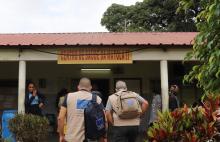Q&A with the Directorate-General for European Civil Protection and Civil Aid Operations (ECHO)
Brazzaville – Rolling out the COVID 19 vaccination campaign across the continent has been a challenging task. So, what happens in a country grappling with humanitarian crisis as well? Ian Van Engelgem, Technical Assistant in the European Commission’s Humanitarian Aid and Civil Protection department’s (ECHO) office in Kinshasa in the Democratic Republic of the Congo, discusses EU’s support to the efforts by WHO and partners to deliver the vaccine in 15 African countries facing humanitarian crises.
Why is The European Commission's Humanitarian Aid and Civil Protection department’s (ECHO) support to WHO focusing on COVID-19 vaccination among vulnerable populations in 15 African countries?
In early 2021, the European Union (EU) launched a €100 million humanitarian initiative to support the rollout of vaccination campaigns in Africa and ensure that vaccines against COVID-19 would reach the most vulnerable populations, including people in hard-to-access humanitarian crisis settings.
The initiative is split into two parts. In the first of these, UN agencies have been allocated €35 million, of which €16 million has gone to the World Health Organization (WHO), to support coordination and capacity building of national health systems, implement activities related to vaccination information management, and address critical logistical gaps. The second aspect of the programme, with an allocation of €65 million, supports a wide array of further activities, including on-demand creation and last mile delivery of vaccines in humanitarian settings. These activities are being implemented by 26 EU humanitarian partners in 34 countries.
The 15 African countries supported by WHO are facing humanitarian crises that present specific challenges to the implementation of nationwide public health measures, particularly in conflict-affected areas. ECHO is engaged in ongoing humanitarian actions and partnerships, including with UN agencies, in these countries that contribute to the national vaccination drive with a focus on the most vulnerable populations.
Another area of support is improving data management for COVID-19 vaccination – why is this important for the COVID-19 vaccination response in Africa?
Just as mobile phones and mobile money have managed to make significant technological leaps forward, so too should digital health information systems. We need to keep improving the performance and operation of these systems while ensuring that they remain inclusive and leave no one behind. Data on both the total number of people vaccinated over time as well as demographic trends) needs to be analyzed constantly and in real time.
Digitalizing nationwide vaccination drives has proved to be a complex process, in part due to the global scale of the pandemic and the associated procurement issues, and this has at times delayed implementation. But having access to centralized real time data through digitalized health systems is critical to success and ECHO funding for WHO and other partners is contributing to this endeavor.
How do you see Africa’s COVID-19 vaccination programme progressing in 2022?
Many countries in the midst of humanitarian crises have encountered a range of difficulties in rolling out COVID-19 vaccination. But over the past weeks, some of these countries have reported significant increases in vaccination numbers. Whether these positive evolutions will continue remains to be seen, especially as global interest in the pandemic begins to wane.
Taking into consideration both currently available and forthcoming resources, governments, communities and partners should reflect on how to maintain the additional capacity they have gained and continue to bolster health and humanitarian systems to deal with future health emergencies in a more efficient and collaborative fashion.
COVID-19 is likely here to stay, so vaccination will need to be integrated into national packages of essential health services together with routine immunizations for other antigens. The aim should be to make sure that anyone and everyone who wants to be vaccinated for the virus has access to these vaccines -- most notably, healthcare workers, the elderly, and people with co-morbidities, irrespective of where they live.



